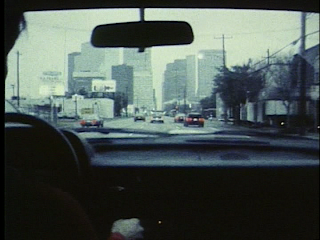This week, Cody talks about the French film Betty Blue and Richard Linklater's It's Impossible to Learn to Plow by Reading Books.
BETTY BLUE (1986)
Or, as it's known in its country of origin, 37°2 le matin.
Jean-Hugues Anglade and Béatrice Dalle star in this interesting chronicle of the often tumultuous relationship between Zorg and Betty.
Zorg is a man who feels like the world wasn't made for him, he's got a simple life working odd jobs and living in a beach shack when Betty comes along and stirs things up with an impetuous nature and violent, potentially dangerous mood swings. They've only known each other for a week of sex-filled nights when Betty comes over with the news that she's moving in.
When Zorg is hired to paint the five hundred bungalows on the beach, Betty is led to believe that he only has to paint one. When she finds out that he's really expected to paint all of them, the house-wrecking rage that follows is how she discovers the manuscript of a novel that Zorg has written, handwritten pages that fill so many notebooks that it looks like it could rival a Stephen King epic. Betty reads the manuscript and finds it to be a work of genius, setting out to type it up to send to publishers while admonishing Zorg for wasting his time doing odd jobs when he should be a novelist... But it's the only thing Zorg has ever written, and he can't bring himself to write any more.
Zorg has only gotten a couple bungalows painted when an act by Betty forces them to flee the beach, and it's a good thing because he was painting the buildings blue and pink, so those paint jobs only had a handful of years before those '80s pastels would be out of style and they'd have to be painted over anyway.
Zorg and Betty set off to try to get the novel published - resulting in some over-the-top negative rejection letters - and try to get by in the world together as Betty's issues become more and more of a problem.
Anglade and Dalle are great in their roles. The only movie I've seen Dalle in other than this one was Inside (2007), so after a few years of knowing her as a homicidal psycho bitch it was interesting to see her here as a very cute and frequently nude twenty-something. And if a nude Dalle doesn't appeal to you, there's a whole lot of full frontal Anglade on display as well.
Writer/director Jean-Jacques Beineix adapted the story from a novel by Philippe Djian and the film is wonderfully shot, with cinematographer Jean-François Robin capturing some beautiful images.
The theatrical cut that I watched is 116 minutes long, a director's cut was recently released that boosts the running time up to 185 minutes.
IT'S IMPOSSIBLE TO LEARN TO PLOW BY READING BOOKS (1988)
Richard Linklater is one of my favorite filmmakers and one my biggest inspirations. His first feature, It's Impossible to Learn to Plow by Reading Books, was made in about the most primitive way possible, almost entirely by just Linklater alone, setting up a Super 8 camera and filming himself going through the motions of everyday life. He goes grocery shopping, does laundry, sits around bored, sticks a rifle out his apartment window and fires a shot, we don't see at what...
There is a modicum of story, not told in a traditional manner at all. Through a phone message in the beginning and snippets of dialogue later, we learn that Linklater's character is a Texas college student who's been in a downbeat mood lately and isn't looking forward to the next semester of school. A friend living in Montana invites him to visit, so he skips the semester and goes traveling around the country. We accompany him on trains and buses and watch him sleeping, brushing his teeth, staring out windows and hanging out in terminals.
The low-key approach continues even when the character stops by his friend's in Montana. They go hiking, watch TV, shoot hoops, play pool. When they talk, the camera is always set up a distance from them, even down a hallway from them, like we're eavesdropping on things we're not included in. Most of it's monosyllabic, day-to-day stuff, but this being a Linklater film there is a scene of a character reading aloud from Conversations with Kafka.
It's a film about nothing special in which nothing much happens, but I find it kind of fascinating, and it's nice to see the evidence that a filmmaker who has had success and made a name for himself had such relatable beginnings. Linklater's second feature, Slacker, is inspiring because it seems like it's on a technical level that you could reach, this one is inspiring because it's on the same level as any aspiring filmmaker starts at, they just probably wouldn't use Super 8 now.
The film is included as a bonus feature on Criterion's release of Slacker, and if you get tired of the sparseness of the film itself you can always switch over to Linklater's very interesting audio commentary.






No comments:
Post a Comment